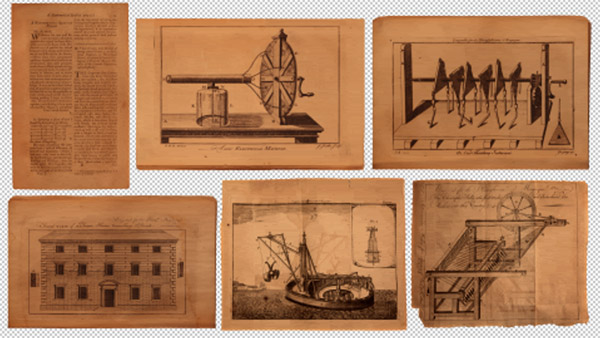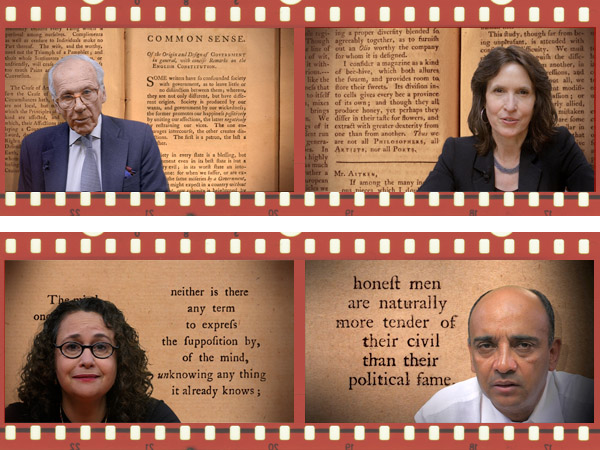In the 18th century both Common Sense and The Rights of Man sold more copies than any other printed works in history. And perhaps no other writer of The Enlightenment remains as relevant to the issues and debates of our own times.
Paine’s words as spoken will breathe life into his tracts and ideas. No other voice from that time spoke as passionately about social justice, human rights, and the benefits of secular constitutional democracy.
Through a series of vignettes expounding both his writings and his obscured role in our history, the film will seek to renew our connection to a sense of citizen engagement, one that established his place as the “Father of the Founders” (in the words of Thomas Edison).
 Interwoven with the readings, quick background narratives will cover such topics as the history of printing technology, English parliamentary history, religious philosophies (Quakers, Methodists, et alia), and the intersection of science & religion in the wake of Isaac Newton. The context is The Enlightenment.
Interwoven with the readings, quick background narratives will cover such topics as the history of printing technology, English parliamentary history, religious philosophies (Quakers, Methodists, et alia), and the intersection of science & religion in the wake of Isaac Newton. The context is The Enlightenment.
 The film will be a free form graphic dissertation, inspired by scientific dioramas and illustrations, with graphical layering of documented period objects (e.g. a working antique printing press, printed pamphlets, maps, paintings, etc.) that will supplant the artificiality of the feigned character of “recreated” documentary.
The film will be a free form graphic dissertation, inspired by scientific dioramas and illustrations, with graphical layering of documented period objects (e.g. a working antique printing press, printed pamphlets, maps, paintings, etc.) that will supplant the artificiality of the feigned character of “recreated” documentary.

See demo videos.
More than any other public figure of the eighteenth century,
Tom Paine strikes our times like a trumpet blast from a distant world.
- John Keane, Biographer of Thomas Paine
A Few Quotations
- I never made it a consideration whether the subject was popular or unpopular, but whether it was right or wrong; for that which is right will become popular, and that which is wrong, though by mistake it may obtain the cry or fashion of the day, will soon lose the power of delusion, and sink into disesteem.
-(Crisis X) On Financing the War
- “Where there are no distinctions, there can be no superiority; perfect equality affords no temptation.”
-Common Sense
- There are two ways of governing mankind.
First, by keeping them ignorant.
Secondly, by making them wise.
-A Serious Address to the People of Pennsylvania
- Whatever the form or constitution of government may be, it ought to have no other object than the general happiness. When, instead of this, it operates to create and increase wretchedness in any of the parts of society, it is on a wrong system, and reformation is necessary.
-Rights of Man - Part 2
- A thing moderately good is not so good as it ought to be. Moderation in temper is always a virtue, but moderation in principle is always a vice.
-Letter addressed to the addressers on the Late Proclamation
- An army of principles will penetrate where an army of soldiers cannot; it will succeed where diplomatic management would fail: it is neither the Rhine, the Channel, nor the ocean that can arrest its progress: it will march on the horizon of the world, and it will conquer.
- Agrarian Justice
- And remember, that in all countries where the freedom of the poor has been taken away, in whole or in part, that the freedom of the rich lost its defense… Freedom must have all or none, and she must have them equally.
-A Serious Address to the People of Pennsylvania
- Where the rights of men are equal, every man must finally see the necessity of protecting the rights of others as the most effectual security for his own.
-Dissertation on the First Principles of Government
- My own mind is my own church. All national institutions of churches, whether Jewish, Christian or Turkish, appear to me no other than human inventions, set up to terrify and enslave mankind, and monopolize power and profit.
-Age of Reason - Part 1
- The honesty of the press is as great an object to society as the freedom of it.
-The Forrester Letters #1
It took a brave man before the Civil War to confess
he had read the Age of Reason …I read it first
when I was a cub pilot, read it with fear and hesitation,
but marveling at its fearlessness and wonderful power.
- Mark Twain




